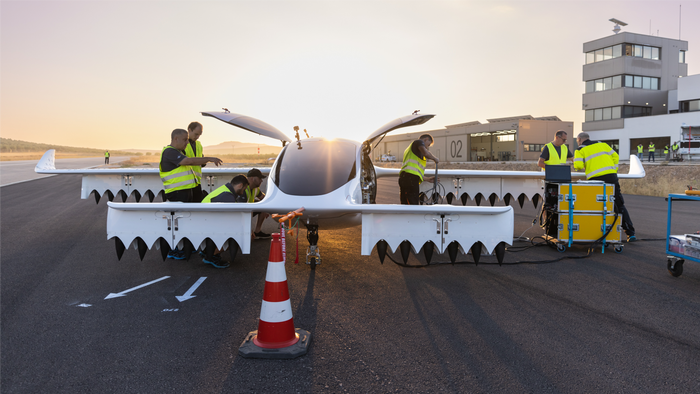Flying Taxi Company Picks Orlando for Network Hub
Lilium has been working with Orlando and Lake Nona and in 2020 announced an urban and regional air mobility network
_(1).png?width=1280&auto=webp&quality=95&format=jpg&disable=upscale)
The developer of an electric vertical takeoff and landing (eVTOL) jet has selected Orlando as the network hub for its operators in central Florida.
Electric aerial vehicle (EAV) maker Lilium plans to use a future vertiport at Orlando International Airport (MCO) as a network hub for Lilium Jet operators in the area.
Lilium has been working with the city of Orlando and Lake Nona for some time, and in 2020 announced an urban and regional air mobility network.
The partners have since worked to develop a full-scale eVTOL vertiport as part of the area’s progress in advanced air mobility (AAM).
“We are thrilled about the proposed advanced aviation center at Orlando International Airport and commend Orlando for its dedication and vision to advancing AAM,” said Sebastien Borel, chief commercial officer at Lilium. “Building a vertiport at the major-hub airport will ultimately enhance regional mobility by increasing passenger access and connectivity while allowing multiple operators to use the facility and share in the cost.”
Orlando is in the center of Florida and is a major tourist draw with Disney World, Universal and other tourist attractions.
The Lilium eVTOL craft is a jet, unlike most EAVs.
.png?width=700&auto=webp&quality=80&disable=upscale)
The seven-seater vehicle is planned as a regional air mobility service, connecting cities and towns up to 125 miles apart at speeds of up to 185 mph.
The flying vehicle features forward canards (small wings near the front) along with main wings and a distributed propulsion system with fixed landing gear without hydraulics.

During takeoff, the plane would use its 36 electric ducted fans to hover for up to 25 seconds and 20 seconds during the landing phase, according to the company. Most of the flight time would be in the cruise stage with a relatively short takeoff and landing time.
The company estimates the range of the craft at 150 miles.
Lilium recently teamed with the Lufthansa Group to explore opportunities in aviation including ground and flight operations, EAV maintenance and flight training in Europe.
Founded in 2015, Lilium has manufacturing facilities in Munich, Germany, with teams in the U.S. and Europe and recently started production of its vehicle with the European market expected to account for more than 9,000 vehicles through 2035.
Lilium has been growing in several areas.
The company agreed with Citic Offshore Helicopter Company to collaborate to establish an EAV operation network in China, starting with the Greater Bay Area. Additional future services are planned for the Guangdong-Hong Kong-Macao Greater Bay Area, Hainan Island and Tianjin.
Lilium announced that ArcosJet DMCC plans to purchase 10 of its electric jets and become the exclusive dealer for its private jets in the Mideast. Deliveries of the EAVs are expected to start in 2026 with the jets delivered to customers with a maintenance program, pilot training and two charging stations.
Lilium agreed with Denso for technical assistance in optimizing the production of the Lilium jet electric engine. Denso specializes in powertrain electrification and plans to support Lilium in developing equipment and tooling for automation for high-volume production of jet engines and subsystems.
Lilium and Michelin partnered for the design, serial production and support of tires for the Lilium EAV. The two companies started working together more than a year ago to develop and produce custom tires for the electric jet.
The fuselage for the Lilium jet was developed by Aciturri in Spain, with delivery to Lilium facilities in Germany. Aciturri, also a Lilium investor, has designed and manufactured airframe components for Airbus, Boeing and Embraer.
Lilium recently secured $192 million in financing in addition to a coming public offering. It received funding from different investors including board members and Tencent Holdings, an initial backer.
The Federal Aviation Administration (FAA) recently issued Lilium a certificate validation of its jet, having previously obtained airworthiness authority from the European Union Aviation Safety Agency.
The company is not alone in the race for new air transportation services, including flying cars, personal air vehicles, both ultralights, which do not require a pilot license, and certified vehicles, which require a license.
One eVTOL company, Joby Aviation, recently announced the planned building of a facility in Dayton, Ohio, to deliver up to 500 eVTOL vehicles a year. Joby has partnerships with Uber and Delta Air Lines.
Like what you've read? For more stories like this on flying cars and emerging technologies, sign up for our free daily email newsletter to stay updated!
Read more about:
Flying CarsAbout the Author
You May Also Like








